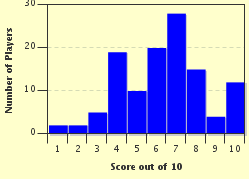Quiz Answer Key and Fun Facts
1. You arrive home from work one day to see your neighbour staring up at the sky. He complains to you about the incoming cumulonimbus clouds and how that's going to ruin his golf game.
Which of these words best describes cumulonimbus clouds?
2. Popping outside one wintry morning after a snowstorm to grab the newspaper, you hear your neighbour griping about a high albedo and how he needs to go grab his sunglasses!
Which of these things is he most likely upset about?
3. Chatting one spring morning, your neighbour is busy tending to their garden when they begin complaining that the previous winter was a "zud" and that means they had to go buy a load of topsoil!
The term zud refers to a harsh winter in what part of the world?
4. The morning after your thunderstorm, your neighbour grumbles to you about the large amounts of sheet lightning that he'd seen the night before. He worried that the storm would knock out hydro right before the big game.
Which of these is not a type of lightning?
5. Chatting with your neighbour after work he complains that he had to drive through graupel on his way home and it made him an hour late!
What does graupel look most similar to?
6. Digging through the garden one afternoon, your neighbour says they need to hurry planting as his barometer suggests some rain and winds tomorrow.
What does a barometer measure?
7. On a hot and dry weekend, your neighbour complains how their garden needs constant attention, and that it is so hot the water is almost sublimating! The lawn and garden need to be watered almost every hour!
Surely your neighbour is so mad he made a Freudian slip there. Sublimation is the process of water changing what state?
8. After a harsh storm, your neighbour complains about how they had just experienced a microburst, not just thunder and lightning. He then proceeds to list all the reasons why his garden and front lawn have been damaged and how it'll take him weeks to repair them.
A microburst, commonly misinterpreted as a tornado, can exist in both wet and dry forms.
9. Not happy by the weather at any time of the year, your neighbour complains one morning about the brutal wind chill.
The coldest wind chill recorded occurred in Antarctica in 1983. With the air temperature of -44°C, the wind chill made it feel like what temperature?
10. A common complaint by your neighbour throughout is that all this horrible weather is because of global warming, or climate change.
Increased temperatures, most affiliated with global warming, are being experienced the most in what part of the world?
Source: Author
George95
This quiz was reviewed by FunTrivia editor
rossian before going online.
Any errors found in FunTrivia content are routinely corrected through our feedback system.

